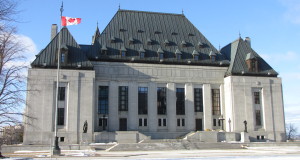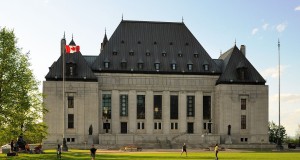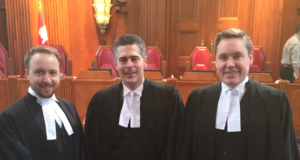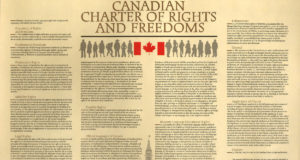Media coverage of the letter written by Quebec’s Minister of the Environment, in opposition to the new federal environmental assessment process, sparked a debate in Le Devoir on the value of Aboriginal traditional knowledge. On the one hand, a group of eight lawyers argued that “[s]ubordination of traditional knowledge to compatibility with scientific data amounts to establishing a hierarchy of ...
Read More »Tag Archives: constitutional law
Comeau is a Casualty of Confused Doctrine
The Supreme Court delivered a bizarre decision last week in R.v. Comeau. By way of background, Comeau concerned the interpretation of s.121 of the Constitution Act, 1867, which states: “All Articles of the Growth, Produce, or Manufacture of any one of the Provinces shall, from and after the Union, be admitted free into each of the other Provinces.” The issue for the Court was ...
Read More »RIP Reasonableness
The Supreme Court recently issued its decision in Quebec (Commission des normes, de l’équité, de la santé et de la sécurité du travail) v Caron, 2018 SCC 3, which may, or may not, be another sign that the Court’s love affair with deference to administrative decision-makers is coming to an end ― in practice if not yet in theory. I ...
Read More »ARL at the Supreme Court
Advocates for the Rule of Law is proud to announce that it has completed its first intervention at the Supreme Court. ARL intervened on behalf of the respondent in the case of Courtoreille v. Canada. ARL argued that the duty to consult principle must be balanced against the principle of legislative sovereignty. If the government fails to consult with Aboriginal groups prior ...
Read More »Why the Appeal to Charter Values Denies the Rule of Law
Barry W. Bussey is Director Legal Affairs, Canadian Council of Christian Charities. He blogs at: lawandreligion.org. The following is an excerpt of his article, “The Charter is Not a Blueprint for Moral Conformity,” (2017) 79 S.C.L.R.(2d) 367, 393-400 It may be trite to say that a liberal democracy must respect the rule of law.[1] Lord Bingham described the core ...
Read More »Debating the Khadr Settlement at Western
Tomorow, I will be traveling to London to debate the following proposition: “The Trudeau government’s decision to award Omar Khadr a $10.5m settlement in July 2017 was an error in law and policy.” My opponent will be Rob De Luca, counsel for the Canadian Civil Liberties Association. I will take the position that the settlement was based on a misapplication ...
Read More »A Province Cannot Shut Down anti-Abortion Expression
This summer, the Ontario government conducted consultations regarding its plan to enact “safe access zones legislation” (SAZL) modeled on British Columbia’s. I’ll give a brief background on B.C.’s law before diving into a division of powers argument against enacting such a law in Ontario. In short, I will argue that just as a province cannot enact a penal prohibition on ...
Read More »“Watertight Compartments” Has Now Been Published
I am pleased to announce that my paper, “Watertight Compartments: Getting Back to the Constitutional Division of Powers” has now been published in the Alberta Law Review. Per the abstract: This article offers a fresh examination of the constitutional division of powers. The author argues that sections 91 and 92 of the Constitution Act, 1867 establish exclusive jurisdictional spheres — ...
Read More »The Notwithstanding Clause is no Longer the Nuclear Option
Section 33 of the Canadian Charter of Rights and Freedoms – better known as the “notwithstanding clause” – is one of the most controversial parts of the Canadian constitution. Despite being an integral part of the formation of the Charter, commentators such as Andrew Coyne have suggested that the provision is “dead letter” or “taboo”. But on Monday, Saskatchewan Premier ...
Read More »Vriend v Alberta Revisited: A Road to Constitutional or Judicial Supremacy?
The Supreme Court of Canada has on numerous occasions insisted upon the primacy of the written text of the Constitution.[1] In the Reference Re Secession of Quebec, the Supreme Court explained that the recognition of underlying constitutional principles “could not be taken as an invitation to dispense with the written text of the Constitution”. It noted that “[a] written constitution ...
Read More » Advocates for the Rule of Law
Advocates for the Rule of Law









